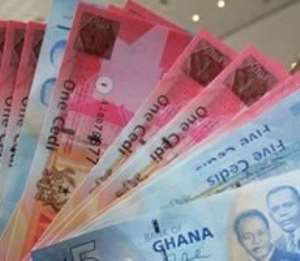
Economist and Financial analyst, Dr Lord Mensah is blaming the Bank of Ghana and the economic management team for the depreciation of the Ghana cedis.
According to Dr Mensah, the lack of a straightforward policy direction in the management of the currency is one of the main causes of the depreciation.
The Ghana Cedi has recently undergone a high appreciable fall in value against other major international currencies with the US Dollar in perspective.
As of Monday 4th, July 2017 commercial banks’ indicative prices quoted by the Bank of Ghana revealed that $1 was being sold at GH¢4.85, compared to ¢4.42 to $1 in September 2017.
Speaking to JoyBusiness, Dr Lord Mensah, who is also a lecturer at the University of Ghana Business School, said, the wobbling nature of Ghana Cedi can be blamed on the regulators for their hybrid management of the local currency.
“Now we find ourselves in a hybrid kind of management of the currency, there is an opened market where we allow demand and supply to strictly determine the levels of the cedi without any interventions from the regulator or government.
But as we speak now we don’t know the practice in Ghana, the moment an information comes out that the cedi is depreciating, then quickly the regulators step in with some cedi to see if they can rescue the situation.”
So far, the depreciation of the local currency is the highest value drop since President Nana Addo Dankwa Akufo-Addo took office in 2017.
The rising dollar is attributable mainly to a trade war between China and US, repatriation of profits by multinational companies in Ghana and also the increasing importation of goods into the country as against low exports.
The rise and fall of crude oil prices appear to have also mounted pressure on the Ghana cedi with respect to the dollar.
Dr Mensah further stated that “we have to clearly spell out the kind of practice we want to follow, either by a regime of intervention or the regime of flexibility where we allow purely demand and supply or the markets to decide by determining the value of the currency.
And I presume that will play the role in the currency stability. Now we don’t really know as to how we can control the cedi.”
Furthermore, analysts believe a recent proposal by the US to cut corporate taxes and boost spending for manufacturing, education, innovation and infrastructure in the world’s largest economy, in addition to creating jobs and spurring growth might be reasons for the dollar’s increase in value.
Raw materials imported from overseas by manufacturing firms would also impact on prices on the local market. Consumers, therefore, stand at a great disadvantage as they would need more money to buy goods.
An unstable exchange rate will also prevent foreign investors from putting their capital in Ghanaian equities since they will record losses at the time they would be retrieving their investments.
The free fall of the Ghana cedi impacts on both importers and exporters and could trigger inflation hikes. Prices of goods tend to go up anytime the Ghana cedi falls against the US dollar especially since the local currency is pegged to the American currency.
It is also likely the phenomenon could affect the Gross International Reserves position of the Bank of Ghana or the Balance of Payment of the country, most analysts and market watchers have indicated.




 Akufo-Addo’s govt is the ‘biggest political scam’ in Ghana’s history – Mahama ja...
Akufo-Addo’s govt is the ‘biggest political scam’ in Ghana’s history – Mahama ja...
 Performance Tracker is not evidence-based — Mahama
Performance Tracker is not evidence-based — Mahama
 Four arrested for allegedly stealing EC laptops caged
Four arrested for allegedly stealing EC laptops caged
 $360 million IMF bailout not enough for Ghana – UGBS Professor
$360 million IMF bailout not enough for Ghana – UGBS Professor
 Shrinking Penis Allegations: Victim referred to trauma hospital due to severity ...
Shrinking Penis Allegations: Victim referred to trauma hospital due to severity ...
 Adu Boahen Murder: Case adjourned to May 9
Adu Boahen Murder: Case adjourned to May 9
 ‘I've health issues so I want to leave quietly and endure my pain’ — Joe Wise ex...
‘I've health issues so I want to leave quietly and endure my pain’ — Joe Wise ex...
 Let’s help seek second independence for Ghana before NPP sells the country – Law...
Let’s help seek second independence for Ghana before NPP sells the country – Law...
 New Force aims to redeem Ghana and West Africa — Nana Kwame Bediako
New Force aims to redeem Ghana and West Africa — Nana Kwame Bediako
 ‘I didn't say I would buy Ghana if voted against; I said I’ll buy it back from f...
‘I didn't say I would buy Ghana if voted against; I said I’ll buy it back from f...
